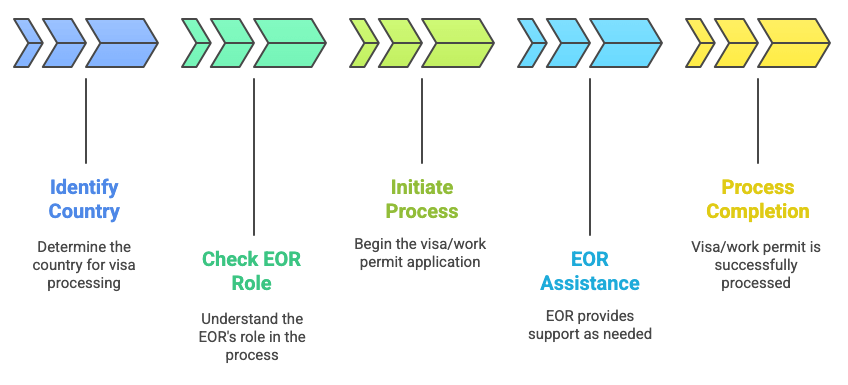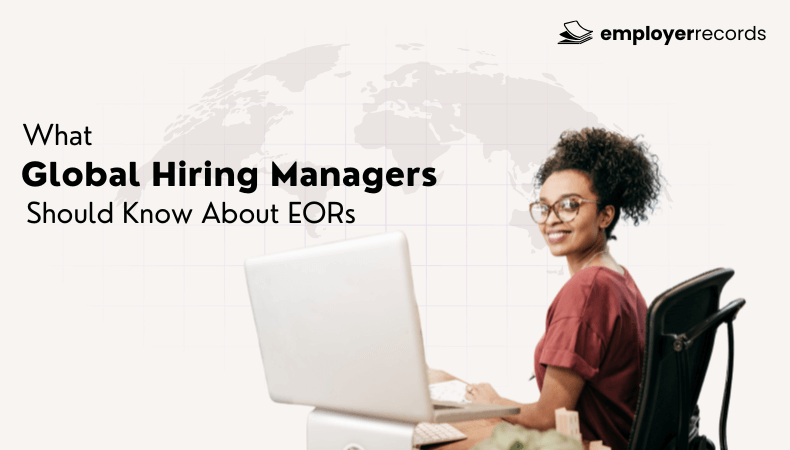Expanding your business internationally unlocks access to diverse talent pools and new markets. However, navigating the complexities of visas and work permits can be daunting.
EORs act as legal employers on behalf of your company, handling administrative tasks like payroll, benefits, and crucially, assisting with visa and work permit applications.
They offer expertise in local immigration laws, manage documentation, and liaise with authorities to ensure compliance and expedite approvals.
However, it’s essential to understand the scope and limitations of EORs in this context. While they can facilitate many aspects of international hiring, certain restrictions and country-specific regulations may apply.
This article delves into what EORs can and cannot do regarding visas and work permits, providing clarity to help your business navigate global expansion effectively.
What Is An Employer Of Record (EOR)?
An Employer of Record (EOR) is a third-party provider that legally employs talent on your behalf in countries where your company lacks a local presence. This allows businesses to hire internationally without opening local entities.
In addition to handling payroll, benefits, and compliance, many EORs assist with visas and work permits to help streamline global hiring.
Need a deeper dive? Read our full guide on What is an Employer of Record (EOR).
How EORs Support Visa Sponsorship and Work Permit Applications?
When expanding into new markets, understanding the role of an Employer of Record (EOR) in managing visas and work permits is crucial.
EORs can significantly streamline the process of hiring international talent by handling various administrative and legal responsibilities associated with employment in foreign jurisdictions. However, it’s important to recognize the specific capabilities and limitations of EORs in this context.
Below, we explore what EORs can do to assist with visas and work permits, providing clarity for businesses aiming to expand their global workforce.
Facilitate Visa And Work Permit Applications
EORs expertly navigate varied immigration systems, preparing and submitting visa and work permit applications on behalf of their clients.
They manage all required documentation, from employment contracts to government-mandated forms, to ensure accuracy and completeness throughout the application process.
By monitoring application status and deadlines, EORs help avoid delays and expedite approvals, reducing administrative burden for hiring teams.
2. Ensure Compliance With Local Immigration Laws
EORs maintain up-to-date knowledge of immigration statutes and visa eligibility criteria across jurisdictions, ensuring applications adhere to current regulations.
They routinely review changes in the law, such as quota adjustments and classification updates, to prevent non-compliance risks like fines or revocations of Unity Communications.
Through ongoing audits and policy checks, EORs safeguard both employer and employee against potential legal pitfalls.
Provide Support for Dependents
Many EORs extend their visa assistance to employees’ families, facilitating dependent visa applications, including spouse and child permits, to ensure cohesive relocations.
They coordinate requisite documentation, such as proof of relationship and financial sponsorship forms, and liaise with immigration authorities on behalf of the entire family unit.
This comprehensive support enhances employee satisfaction and eases the transition to new host countries.
What EORs Cannot Do Regarding Visas And Work Permits?
While EORs provide valuable expertise in managing visa and work permit applications, they remain bound by local immigration statutes and cannot circumvent governmental restrictions or quotas.
Understanding these limitations helps businesses set realistic expectations and ensures all international hires comply with country-specific sponsorship requirements and regulations.
Override Governmental Restrictions
EORs can coordinate and submit visa applications, but must abide by each country’s immigration laws and statutory quotas set by government agencies.
These quotas may include annual caps on specific visa categories, such as the 65,000 H-1B limit in the U.S. with an additional 20,000 for advanced-degree holders, and profession-based allocations that cannot be exceeded.
EORs lack the authority to alter visa restrictions or increase quota thresholds, so application success hinges on compliance rather than negotiation with immigration authorities.
Guarantee Visa Or Work Permit Approval
While EORs prepare and submit complete visa and work permit applications, final approval remains the prerogative of governmental bodies like USCIS or local immigration authorities.
Approval depends on myriad factors, including the applicant’s qualifications, documentation accuracy, and alignment with current immigration policies and labor market tests.
Consequently, EOR facilitation can enhance application quality and timing, but cannot assure visa grants or expat relocation outcomes.
Sponsor Visas In All Countries
Not all jurisdictions recognize EORs as legitimate visa sponsors; some require a local corporate entity or specific licensing to assume employer-of-record responsibilities.
For example, Dutch authorities have proposed new restrictions that limit EOR-sponsored arrangements for highly skilled migrants without a physical presence or a Dutch operating license.
Businesses must verify an EOR’s sponsorship authority in each target country before engagement to avoid compliance risks and hiring delays.
Country-Specific Considerations
Because immigration regulations differ markedly across jurisdictions, it’s essential to understand how each country’s visa and work permit requirements may affect your ability to hire through an EOR.
Here’s a Country Comparison Table you can directly use to summarize visa/work permit support via EOR across key countries. This table will improve skimmability and visual appeal:
| Country | Can EOR Sponsor Visas? | Key Requirements/Notes | Typical Processing Time |
|---|---|---|---|
| Germany | Yes (via local entity/partner) | Must meet salary thresholds (EU Blue Card) and role-specific criteria. | 8–12 weeks |
| Netherlands | Limited (restrictions tightening) | EOR/partner must hold Recognized Sponsor status. New proposals limit use for highly skilled migrants. | 6–10 weeks |
| India | Support only (no direct sponsorship) | Local entity must sponsor. EOR assists with contracts, payroll, and documentation. | 3–6 weeks |
| UK | Yes (if licensed/partnered) | Must comply with Skilled Worker visa salary and occupation list requirements. | 3–8 weeks |
| Indonesia | Yes (via local partner) | IMTA and KITAS permits required. Quotas apply. | 4–10 weeks |
| USA | No (cannot sponsor directly) | U.S. visas (H-1B, L-1) must be sponsored by qualified U.S. entity. EOR can manage payroll, not sponsorship. | Highly variable |
| Singapore | Yes (with license/partner) | Employment Pass (EP) sponsorship possible via licensed local entity. | 3–6 weeks |
| UAE | Yes (via Free Zone licenses) | Sponsorship tied to trade license in Free Zones (e.g., DMCC). | 2–4 weeks |
| Australia | Yes (via SBS partner) | Requires Standard Business Sponsor (SBS) partnership to sponsor TSS visas. | 4–10 weeks |
| Canada | No (cannot sponsor directly) | Requires LMIA through Canadian entity. EORs support compliance and hiring of pre-permitted workers. | 2–6 weeks (Global Talent Stream) |
Germany
- EOR must partner with a licensed German entity.
- Requires meeting EU Blue Card salary thresholds.
- Permits tied to specific job roles.
- Strict immigration compliance; plan 8–12 weeks in advance.
Netherlands
- Direct EOR sponsorship tightening under 2025 regulations.
- EORs need Recognized Sponsor status via IND.
- New rules limit sponsorship to 2 years.
- Regular audits required for compliance.
India
- EORs assist but cannot sponsor directly.
- Local entity required as primary visa sponsor.
- Employment Visa demands proof of unique skills.
- EOR manages contracts and compliance.
United Kingdom
- EORs must be licensed sponsors or work via partners.
- Salary and occupation list compliance required.
- EU nationals now need visas post-Brexit.
- EOR handles documentation but within licensing rules.
Indonesia
- Local partnerships essential for IMTA and KITAS permits.
- Foreign worker quotas apply by role.
- Frequent regulatory updates.
- EORs cannot sponsor directly without a local license.
United States
- EORs cannot sponsor U.S. work visas.
- Sponsorship must be by a U.S. entity.
- EORs manage payroll for pre-authorized workers only.
- Strict H-1B caps apply.
Singapore
- EORs can sponsor Employment Passes directly.
- Local business license required.
- Salary thresholds apply (S$5,000+).
- Many EORs use local partnerships.
UAE
- Full compliance with UAE labor law required.
- Visas sponsored via Free Zone licenses.
- EOR must have valid Free Zone trade license.
- Work visas valid 1–3 years, renewable.
Australia
- No direct sponsorship without SBS status.
- EORs need Standard Business Sponsor (SBS) partnerships.
- TSS visa salary and testing rules apply.
- Many EORs operate via local SBS partners.
Canada
- Global Talent Stream allows 2-week permit processing.
- EORs cannot sponsor work permits.
- Canadian entity required for LMIA-based applications.
- EOR supports hiring after permit approval.
Best Practices For Working With EORs On Visas And Work Permits
Focus on proven strategies that enhance efficiency and compliance to ensure your partnership with an EOR delivers seamless visa and work permit support.
Implementing these best practices will help you minimize processing delays, reduce legal risks, and create a smoother international hiring experience.
1. Conduct Thorough Research: Before selecting an EOR partner, conduct detailed due diligence on their track record, service offerings, and geographic coverage.
Evaluate case studies and client testimonials, such as those from RemoFirst and Wisemonk, to gauge their effectiveness in managing visa and work permit processes.
Compare pricing models and service level agreements to ensure alignment with your budget and compliance needs.
2. Verify Legal Standing: Ensure your chosen EOR holds the necessary licenses and registrations to sponsor visas in your target countries.
Confirm they have a local legal presence or partnerships that satisfy governmental requirements, as some jurisdictions restrict third-party sponsorships. Review regulatory filings or accreditation indices to validate their authority before proceeding.
3. Maintain Open Communication: Establish regular check-ins and designate primary contacts to share updates on visa and work permit application statuses.
Use collaborative platforms or shared dashboards for real-time visibility, ensuring any document requests or legal changes are addressed promptly.
4. Plan Ahead: Initiate visa and work permit applications at least three to six months before the intended start date to accommodate administrative backlogs and potential government delays.
Build buffer time into your hiring timeline, factoring in country-specific processing averages, such as 2–6 weeks for business visas, to avoid onboarding holdups.
PE Risk Mitigation Framework

Conclusion
Employers of Record serve as indispensable partners for businesses navigating the complexities of global workforce expansion, especially regarding visas and work permits.
By acting as the legal employer in foreign jurisdictions, EORs handle critical immigration steps, including sponsorship applications, documentation, and liaison with government agencies, thereby reducing administrative burdens on the hiring company.
Their in-depth knowledge of local immigration regulations and continuous monitoring of legal changes ensures full compliance and mitigates risks of fines or application denials.
Through streamlined processes and proactive support, EORs can significantly accelerate approval timelines and improve onboarding experiences for international hires.
However, they cannot override statutory quotas, guarantee government approval, or operate beyond each country’s legal framework. Some jurisdictions restrict third-party visa sponsorship, making it essential to verify an EOR’s licensing and legal standing before engaging.
Additionally, EOR arrangements may impose limits on work permit durations and permissible activities and can trigger permanent establishment risks if not carefully structured.
By understanding these constraints and maintaining collaborative communication with their EOR partner, businesses can effectively leverage EOR services to build compliant, agile international teams.







